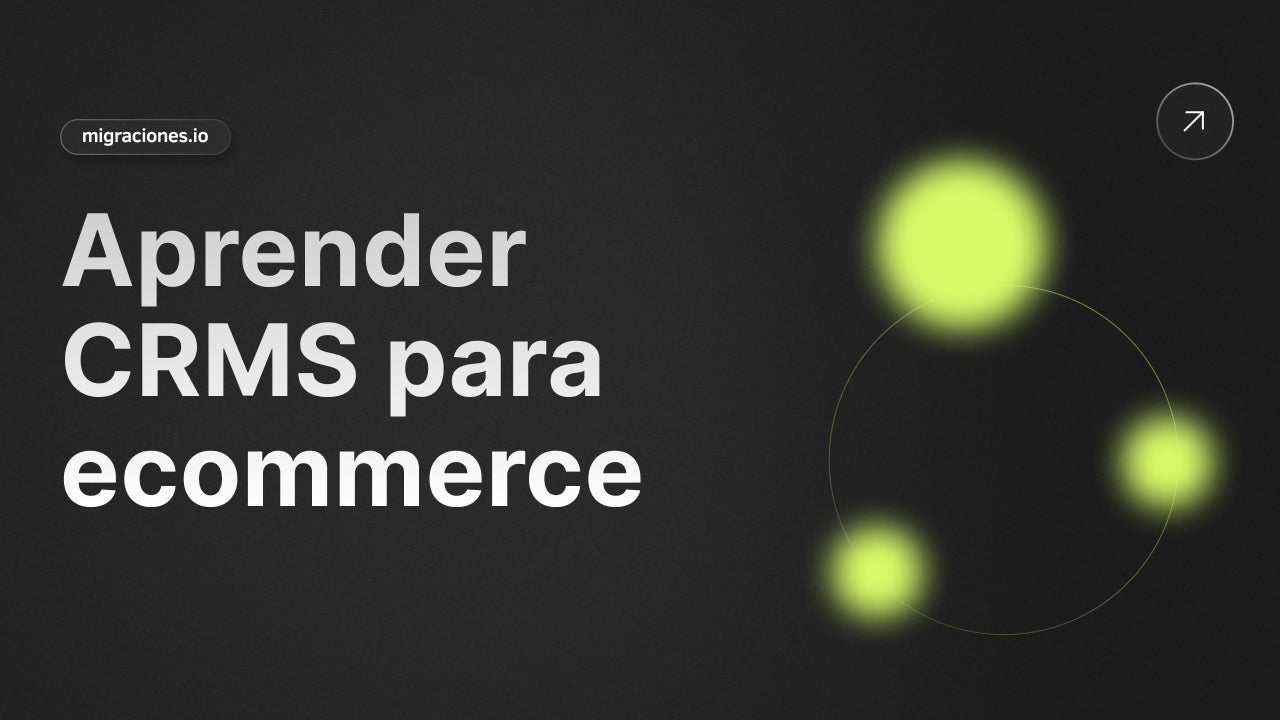

Managing an online store efficiently requires advanced tools that optimize processes and improve customer experience. A CRM for ecommerce can be the key to increasing your sales and building customer loyalty .
In this article, we'll explain what a CRM is, its benefits, and the best CRMs for online stores . If you already have or are thinking about migrating your online store to Shopify, Shopify Migrations can help you make the jump without any complications.
An ecommerce CRM is a platform that centralizes information such as purchase histories, brand interactions, and customer preferences . This allows businesses to offer a personalized experience and improve their sales strategy .
For example, with a CRM you can segment your customers based on their previous purchases or browsing behavior in your online store . This way, you could send exclusive offers to frequent buyers or win back inactive customers with personalized emails. This personalization capability not only improves the customer experience, but also increases the likelihood of loyalty and repeat purchases.
While both types of CRM share the goal of managing customer relationships, an ecommerce CRM is optimized for online stores. Some key differences include:
According to studies, companies that use a CRM increase their revenue per customer by up to 41%. This is essential for e-commerce companies looking to scale their sales.
Choosing the right CRM can make all the difference in the management and success of your online store. Here are the key features that can't be missing:
A good CRM should seamlessly connect with your online store. If you use Shopify, make sure the CRM can sync inventory, orders, and customer data in real time . This makes management easier and reduces errors, such as data duplication.
Automation is key to scaling an online business. Look for a CRM that allows you to create automatic workflows to send segmented emails, post-sale messages or special promotions .
For example, you can automate a retargeting campaign for customers who have abandoned their cart.
In a digital environment, protecting your customers’ information is crucial. Opt for a CRM that complies with regulations such as GDPR and offers data encryption features . Also, make sure the platform has regular backups and failover systems.

Below, we present the most recommended CRMs for ecommerce:
HubSpot CRM is known for its intuitive interface and powerful automation tools . Its integration with Shopify allows you to sync customer data and create personalized strategies. It also has advanced analysis and segmentation tools.
This CRM is ideal for large e-commerce sites looking for scalability . It offers advanced analytics, robust integrations, and support for omnichannel sales . Salesforce also stands out for its customizable solutions, tailored to the needs of each business.
Zoho CRM is an affordable solution for small and medium-sized businesses . It includes marketing tools, inventory management, and sales automation . Its value for money makes it a popular choice among entrepreneurs .
Monday stands out for its flexibility . You can customize workflows and manage tasks collaboratively . It is ideal for teams looking for a platform that combines project management and CRM.
Pipedrive is designed to simplify tracking leads and sales . It’s a lightweight yet powerful option for growing ecommerce. Its focus on ease of use makes it an accessible tool for new users .
Zendesk is perfect for ecommerce businesses that prioritize customer service . It offers advanced support tools and interaction tracking, improving customer satisfaction and building loyalty.
Before choosing a CRM, consider your business’s specific needs. Are you looking to improve loyalty, streamline processes, or increase sales? For example, if automation is your priority, look for a CRM with advanced workflows .
A CRM should be a tool that makes your day-to-day life easier. Make sure its interface is simple and includes tutorials or support for new users. This is especially important if your team has no prior experience with these platforms.
Your CRM should be able to connect with the apps you already use, such as Shopify, Mailchimp, or Google Analytics . This will avoid duplication of effort and improve efficiency. For example, integrating your CRM with an email marketing tool can automate targeted campaigns.
Weigh the costs and benefits of each CRM. An initial investment in a CRM can translate into a significant increase in your revenue in the long run. Also consider the support and updates included in the price.
If you are considering migrating your online store to Shopify and need a CRM that fits your needs, Shopify Migrations is your ally to optimize your business.